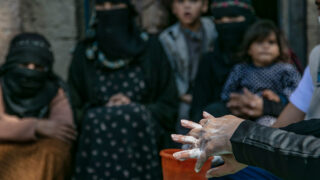
This publication has benefited from the support of the Rosa Luxemburg Foundation. This text may be reproduced in part or in full, provided the source is acknowledged.
On November 8, 2021, a Houthi court sentenced the 20-year-old actress and model Intisar al-Hammadi to five years in prison for “committing an indecent act”, by publishing her professional photos which respected… modesty! Three days later, the young journalist, Rasha al-Harazi, was assassinated in a car bombing that killed her husband and unborn child too, as she was on her way to the hospital to give birth. Before these two incidences, Samiha al-Asadi was slaughtered by her 19-year-old brother in 2018, in the middle of the courtroom and before everyone’s eyes, simply because she asked the judge to officiate her marriage, because her father and brothers had unjustifiably refused to give her their permission to remarry - and of course because she could not marry by her own judgement, without male approval. Later in 2020, the murderer was acquitted because he had claimed it was an “honor killing”.
However, traditional/tribal customs that protect women are often a source of pride for Yemenis, as inflicting harm on women, whether through harassment or murder, is considered a “black shame”; a source of the utmost disgrace, and the blood money for killing a woman during a conflict is four times that of a man. Tribal customs grant women the ability to put an end to a conflict and stop the prosecution of a killer if he asks for their help, among other advantages enjoyed exclusively by Yemeni women. However, as this legacy continues to be revered, other facts emerge on the ground that reflect a gap between the reality that women actually live in, and the “narrative” around them.
The violence inflicted on Yemeni women is not limited to the murder, harassment, and legislation designed to deprive women of their agency. It is also a “special” kind of violence that perhaps has already been overcome by most of the world’s societies. For example, Yemeni women cannot sit by a window or in an open space next to their homes to cool off, even in the 45-degree Celsius summer heat. Women are not permitted to decide what TV channels they watch, what color of clothes they wear outside, where they go, or what majors they can study. There is violence in the silence imposed on them, in the indifference towards their wellbeing and the disregard for their lives, in the unsafe streets that make them wish they were never born female, in the lack of any kind of protection or shelter, in addition to the violence of being forced into an inferior, marginal position in society: in the domains of education, health, development, human rights, etc. Hence, when Yemen is described as ranked last in the world with regard to women’s rights, this is no exaggeration, but rather a reflection of a bitter truth.
We are talking about issues that women all over Yemen face, as there are no major differences in women’s circumstances between the rural areas and the cities. It is true that the city presents greater opportunities to women in fields such as education, work, travel, and makes a promise, no matter how small, of freedom. However, this does not mean that cities are more “hospitable” places for women, as injustice - in its various forms - affects Yemeni women everywhere. This includes women in the south of the country which was once ruled by a left-wing state that respected women’s rights and gave space for freedoms, where these achievements have receded to the point of nearly disappearing.
A joke, an insult, then an indisputable fact
Numerous proverbs and axioms contribute to shaping everyday social action and reaction towards women. These proverbs penetrate deeply into the collective social memory, and turn into an integral part of popular culture.
Most of the statements that downgrade women refer to a saying of religious origins: “Women are deficient in reason and religion.” Whenever women’s opinions are belittled and whenever trivial matters are discussed by men, for instance, these matters are branded, scornfully, as “women talk”. This judgement always derives its “credibility” from that saying, as if it is proven beyond doubt, by religious reference, that women are intrinsically deficient in reason. Hence, how could they possibly possess the wisdom to say anything of use?
It is not just what women say or think that are taken lightly, as women’s lives are also trivialized. According to the law, a woman’s life is worth half the life of a man (1), despite the quotidian pride in the traditional customs that make a woman’s blood money worth four times that of a man. In daily conversations, one always hears phrases such as, “She is but a girl, she is but a woman.” “But” here means “a mere,” and symbolizes the smallness of the person in question, as no serious consideration should be given to this secondary and marginal being. Thus, the word “woman” in its Yemeni pronunciation, “Mara,” has become the most horrendous insult that can be hurled against a man.
Traditional/tribal customs that protect women are often a source of pride for Yemenis, as inflicting harm on women, whether through harassment or murder, is considered a “black shame”; a source of the utmost disgrace. The blood money for killing a woman during a conflict is four times that of a man. Tribal customs grant women the ability to put an end to a conflict and stop the prosecution of a killer if he asks for their help, among other advantages. However, as this legacy continues to be revered, other facts emerge on the ground.
It seems that women are a staple in the lexicon of insults in varying cultures; however, a very specific additional expression has been added to those insults in the Yemeni context, where women as an absolute category are bluntly referred to as a “shame” (‘Aar). One of the most widely used curse words in Yemen is “damn your shame,” or “fuck your shame,” in which “shame” unequivocally and directly refers to the female kin of the man on the receiving end of the insult; the women who are a disgrace in and of themselves, both physically and symbolically.
Legalizing the marginalization of women and reinforcing male hegemony over their lives
Yemeni law has two main characteristics when it comes to articles about women: The first is that it has moved backward instead of progressively with regard to women’s rights, and the second is that it is riddled with a plethora of violently discriminatory articles, typically vaguely worded, making it difficult for someone reading them to actually believe that these articles are still applicable in our day and time.
One can enumerate 11 articles from the Personal Status Law that regard women as “lesser” beings, to say the least, deficient in reason and lacking in agency. These Articles are 6, 7, 15, 16, 19, 20, 23, 40 with its four paragraphs, Article 68, the third paragraph of Article 86 (among others), and Article 127.
The Personal Status Law gives special care to the miniscule details of marriage regulations, starting from Article 6, which states that a woman must be legally “halal” for a man so that he can marry her. This one-sided equation may seem ordinary, but the question that begs the answer is: “She” has to be halal, but what about “him”?
This is followed by Article 7, which requires the presence of a “male” in the marriage ceremony, and Article 15, which legalizes the marriage of underage girls as long as they are found “fit for intercourse”. The latter is a specimen of those articles that have grown more backward instead of moving progressively, as Yemen had specified the age of marriage at 15 years in the North and 16 years in South Yemen. The law changed when the Islamists took control in the late nineties, and in 1999 the age requirement was abolished altogether, thus rendering the marriage of young girls legal at any age.
The violence inflicted on Yemeni women is not limited to the murder, harassment, and legislation designed to deprive women of their agency. It is also a “special” kind of violence: Yemeni women cannot sit by a window to cool off, even in the 45-degree Celsius summer heat. Women are not permitted to decide what TV channels they watch, what color of clothes they wear outside, where they go, or what majors they can study. There is violence in the silence imposed on them, in the indifference towards their wellbeing and the disregard for their lives.
Then there is Article 16, which determines the fate of women in other aspects of their lives. The law states that: the guardian of the marriage contract is the closest of male kin, in order of the degree of kinship; from the father to the son – no matter how far related they may be to the bride, then her brothers, then their sons, then the woman’s paternal uncles, then their sons, then her father’s paternal uncles, then their sons. Whoever is related to the bride from both the maternal and paternal sides are given priority, and in case of multiple guardians of the same degree of kinship, each of them is given guardianship over her marriage. In the case of equal guardianship, the contract made first is legally valid, and the marriage contract made at any later point by the other guardians is annulled if they have married her off to another at the same time. If the time of the contract is disputable, the validity of the marriage contract is annulled.
This article is disastrous in three distinct areas:
1- “The Guardianship.” The requirement for a woman to have a “male guardian” annihilates the notions of equal citizenship and equal rights as stipulated in the constitution, as this article explicitly legalizes the idea that a woman is inept to choose her own partner.
2- The role of the guardian, in the event of a woman’s marriage, is not limited to her father or her brothers. Rather, her incompetence goes far beyond the powers of her first-degree male family members, which means a woman is considered generally incapable of autonomy, with every man in her family better fit for making choices on her behalf.
3- The “lawful” downgrading of women in the matters of marriage, in which the guardians may conflict, thus annulling the contract, or one of them may be able to annul an earlier contract. One of the guardians might even outrun another in making the marriage contract in such a way that makes it impossible for other guardians to break!
Even more dangerously, Article 16 has pushed the doors wide open for its interpretation and appropriation to any women-related issue. Women from various Yemeni regions have been the subject of discriminatory practices whose legal sources remain unknown. One of the mothers, for example, says that her son’s school principle refused that she enrolls her son at school, asking her to bring a male “guardian”. Since the “guardian” was an immigrant, the principle asked the mother to present his ID card, as the birth certificate was deemed insufficient, just as the mother’s presence alone was considered inadequate. After all, “how can a woman who is not even her own “guardian” be the guardian of another person (2)?”
Likewise, women cannot undergo surgeries in hospitals without the signature of a male guardian. When I asked a gynecologist and obstetrician how she would proceed if a C-section is required for a pregnant lady, she replied that she would always ask for the husband's signature to perform the procedure. If the husband refuses to consent, the hospital cannot receive the mother, which might lead to her death. The signature of the woman’s father or brother may substitute for the husband's, but they must sign a paper bearing full responsibility before the husband in case the latter sues the hospital later on. This same gynecologist says that she had been in a critical state when she gave birth to her firstborn and had suffered the risk of death, stating that her husband had refused to sign the papers for her C-section, until her co-workers threatened him, telling him that if the operation does not happen, his child would also die, not only the mother (3).
It is true that women are a staple in the lexicon of insults in varying cultures; however, a very specific expression has been added to those insults in the Yemeni context, in which women are bluntly referred to as a “shame” (‘Aar). One of the most widely used curse words in Yemen is literally “damn your shame,” or “fuck your shame,” where “shame” unequivocally and directly refers to the female relatives of a man; the women who are a disgrace in and of themselves, physically and symbolically.
Examples of these sorts of situations are endless, including opening a bank account for a child or obtaining an identification card or passport, as Yemeni women cannot get their own IDs without the presence of a legal guardian. It does not matter if the guardian is a minor in this case; the important thing is that he is a “male.”
Dr. Muhammad al-Mikhlafi, former Minister of Legal Affairs, says that these requirements are not legal loopholes, but rather “interpretations” made by the various institutions, based solely on the article that mandates guardianship in marriage. (4)
The issue is not confined to the case of marriage, in which a woman’s autonomy is abolished, and in which it is stipulated that the wife must “comply with his (the husband’s) command and fulfill her duties in the marital home” and that she must “not leave the marital home without his (the husband’s) permission (5)”. The case of divorce also confirms the same sort of discrimination, as in Article 68 which stipulates that a man can divorce his wife a “revocable divorce (6),” and that the divorcee is not permitted to leave her house during her “waiting period” (‘Idda) without her ex-husband’s permission. Yet another worrisome matter is that the husband can remarry her without informing her of this, keeping her under the impression that she is still divorced for as long as he wishes.
Women cannot undergo surgeries in hospitals without the signature of a male guardian. When I asked a gynecologist and obstetrician how she would proceed if a C-section is required for a pregnant lady, she replied that she would always ask for the husband's signature to perform the procedure. If the husband refuses to consent, the hospital cannot receive the mother, which might lead to her death.
These laws not only illustrate the extent of the humiliation that women are subjected to, but also reveal the paradox that prevails in every aspect of their reality. Yemeni women can become judges and members of the Supreme Court, but the question arises: Can a woman judge officiate the marriage of another woman who asks for her help? Or, can she, being a judge, be her own “guardian” and marry herself to a man needless of a male guardian?
Walking in the jungle: Harassment is unrecognized and therefore unhindered
“You would like me to tell you about the streets? But you already know everything! Nevertheless, I can tell you about it. I walk from my house to the main street, a distance of perhaps less than twenty meters, during which I endure immeasurable terror and anxiety. A group of motorcyclists usually hangs around at the corner of the main street, and their main activity is harassing me and every other woman passing by. They make fun of us and spew various sexual comments at us. When I finally make it through these twenty meters and get on the bus, another kind of anxiety begins, with the same sort of phrases hurled at me again, but this time accompanied with physical harassment, as hands extend from here and there trying to touch my body. When I get off the bus, I have to cross yet another street until I reach my workplace, which represents another, even more humiliating and agonizing journey. Any passerby, motorcyclist, worker, or salesman, in short any male on the road, feels entitled to make fun of my appearance, verbally assault me, or spew his sexual wishes at me from the window of his passing car, while others on the street laugh about it instead of expressing disapproval. This is what everyday life is like for me. I tried everything: I wore the Niqab (face cover), I put on a Jilbab (baggy dress), I wore baggy clothes. But nothing seemed to work, because being a woman meant being an open target... even though I'm the head of a department at the bank, where everyone respects me.” (7)
Yemeni women may have been able to be ministers, diplomats, members of parliament and Nobel-prize winners, but in fact, they still live in dire conditions when it comes to their rights and well-being. What is more frightening is that the accomplishments once made are now being undone, and the few laws that had once provided some kind of customary or legal shield for women have been violated and nullified since before the war.
Elsewhere in the world, this is called harassment and abuse. In countries other than Yemen, women may resort to the law for protection, but Yemeni law does not even recognize the crime of harassment. There is instead a vague article that condemns indecent acts in public spaces (8). Although the aforementioned acts all fall under the description of an indecent act, it is the women who are often the subjects of this article rather than the men. The interpretation of the article is entirely dependent on the officer’s mood, who may deem an act like riding in the car with a male friend as indecent. For example, in the case of the young model, Intisar al-Hammadi, her photographs were classified as indecent acts (9).
The story above of the female employee enduring harassment is the story of millions of Yemeni women; one that exposes first and foremost the paradox of the popular narrative that glorifies morals, virtue, and the “sanctity” of women on the one hand, while, in reality, violating women’s autonomy and treating them with contempt on the other hand. So while Yemeni women succeed in their excruciating struggle for education and work, their accomplishments are always tarnished by the repetitive abusive behaviors - and the social justifications of such behaviors.
No one in Yemen talks about the daily harassment, rape and everything in between, because in all these cases, women are usually the primary accused party, rather than the perpetrators. Not even young girls are spared from this absurdity. In one incident in July 2017, the religious cleric Abdullah al-Adini justified the rape crime of a three-year-old girl, saying that “the clothes of young girls are the gateway to rape (10).”
“I walk from my house to the main street, a distance of perhaps less than 20 meters, during which I endure immeasurable terror and anxiety. A group of motorcyclists usually hangs around at the corner, and their main activity is harassing me and every other woman passing by. They make fun of us and spew various sexual comments at us. When I finally make it through these 20 meters and get on the bus, another kind of anxiety begins, but this time accompanied with physical harassment.”
“Any male on the street feels entitled to make fun of my appearance, verbally assault me, or spew his sexual wishes at me from the window of his passing car, while others on the street laugh about it instead of expressing disapproval. This is what everyday life is like for me. I tried everything: I wore the Niqab (face cover), modest dresses, baggy clothes. But nothing seemed to work, because being a woman meant being an open target... even though I'm the head of a department at the bank, where everyone respects me.”
During the past few years, the conflicting parties in Yemen have been releasing reports on the violations against women. There was talk about an “unprecedented situation in the history of Yemen,” expressing a “state of shock” from the widespread targeting of women; a shock based on the assumption that women were protected and sheltered from harm in pre-war times. However, the women of Yemen are well aware that the reports merely show an increase in the degree of violence, which has become more formally documented, and that the violations are neither new nor sudden as is implied.
Half an Education, half a life
In 1994, the literacy rate for females in Yemen was less than half that for males, even if we consider the discrepancies between rates in North Yemen and South Yemen before the unification in 1990, when the socialist South Yemen had already made big strides in education and literacy for women.
The united Yemen sought to bridge the gap between genders, but in 2015, that gap was still enormous, with a literacy rate of 85 percent among males, versus only 54.9 percent among females. The disparity is also evident in the rates of enrollment in higher education in 2013, with female enrollment rates registering less than half that of male enrollment rates (11).
As for the current situation, as a viscous war with no end in sight rages on, it is increasingly difficult to aspire to keep those same, already disproportionate, rates… It is true that the war has played its havoc on everyone, but women get the worst of it. Reports speak of the rise in child marriage, gender-based violence, and girls dropping out of school after the Corona pandemic (and before it, too, as a result of the war), in addition to other indicators that demonstrate how the gap is broadening.
No one in Yemen talks about the daily harassment, rape and everything in between, because in all these cases, women are the primary accused party, instead of the perpetrators. Not even young girls are spared from this absurdity. In one incident in July 2017, the religious cleric Abdullah al-Adini justified the rape of a three-year-old girl, saying that “the clothes of young girls are the gateway to rape.”
Women are double victims of society’s policies. Many girls do not go to school because of the issue of gender mixing, and because the government does not recruit more female teachers to cover the shortage. Women do not always seek medical attention when needed, because in many cases men would ask for female doctor for their wives. This reveals the encompassing absurdity of the paradox: How can there be more female teachers, doctors, etc., if girls are not allowed an education in the first place?
The law neither prevents nor protects
An activist who often travels for work has recently told me that the last time she traveled, she had to stay overnight in Aden at a hotel, where a room had been booked for her in advance by the organization she was working with. She says that the man at the hotel’s reception desk refused to allow her to stay there despite the reservation, demanding the presence of a “mahram” (a close male relative like a father or brother) with her. She tried to explain to him that she had no “mahram” at that moment, and that she would leave the country early in the morning the next day, but the man was inexorable. When she asked him if he would rather see her out on the street alone without a “mahram” than let her stay at a hotel room for one night, he coldly answered that she belonged on the street (12).
A woman might encounter this kind of behavior in various situations related to travel, although it doesn’t necessarily always happen. There is no legal justification for a woman to be asked about her “mahram” when travelling solo, but it is also true that more often than not women are asked about this without being able to do as much as complain to authorities about the discrimination they had suffered.
The problem, of course, is more than that of an inconvenient question. One can look at it from another angle: Knowing that the streets themselves are not safe for women, and knowing that women often need a male companion to walk safely, one can wonder what it must be like for a woman who travels thousands of kilometers alone in an environment of war and conflict… Is she able to rent her own house when she cannot as much as book a hotel room? The answer is quite obvious: she would be either rejected or harassed, seen an easy target.
Yemeni women may have been able to be ministers, diplomats, members of parliament and Nobel-prize winners, but in fact, they still live in dire conditions when it comes to their rights and well-being. What is more frightening is that the accomplishments once made are now being undone, and the few laws that had once provided some kind of customary or legal protection for women have been violated and nullified since before the war. Proof of this disturbing reality lies in the numbers of kidnapped women, female detainees, raped and abused women, child marriages and female illiteracy rates...
The content of this publication is the sole responsibility of Assafir Al-Arabi and Rosa Luxemburg Foundation cannot accept any liability for it.
Translated from Arabic by Sabah Jalloul
Published in Assafir Al-Arabi on 18/12/2021
1. Personal Status Law. Article 41: The blood money of a woman is half that of a man.
2. Telephone interview with a Yemeni mother residing in Sana’a, October 2021.
3. Telephone interview with an obstetrician and gynecologist, Abyan city, October 2021.
4. Interview with Dr. Muhammad al-Mikhlafi, former Minister of Legal Affairs, October 2021.
5. Article 40 of the Personal Status Law, paragraphs 3 and 4.
6. Article 68: Revocable divorce does not annul the marriage, and the husband has the right to return his wife into matrimony during the waiting period (‘Iddah).
7. Telephone interview with a young woman living in Sana’a, November 2021.
8. Article 273 of the Penal Code: An indecent act that violates modesty is any act that violates public morals or offends decency, including nudity, intentionally showing private body parts, and words and gestures that violate decency and are against morals.
9. Intisar al-Hammadi: A Houthi court sentences the Yemeni model and actress to 5 years in prison, November 8, 2021.
10. A Yemeni cleric causes controversy on social media: “The clothes of young girls are a gateway to rape,” The Kuwaiti Newspaper “Al-Anbaa”.
11. School is Not Just for Boys: A Look at Girls’ Education in Egypt and Yemen, Isabella Grande, December 2018.
12. Telephone interview with a Yemeni woman from a city adjacent to Aden, October 2021.







